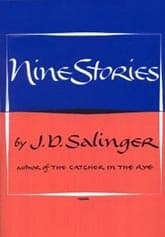A Perfect Day for Bananafish
Critique • Quotes
 First edition of Nine Stories, 1953
First edition of Nine Stories, 1953First publication
1948
Literature form
Story
Writing language
English
Genre
Literary
Author's country
England
Length
Approx. 4,500 words
Fishing in deceptive depths
My first exposure to J.D. Salinger's first story left me with a memory of a lengthy convoluted story. But recently when I read it I discovered it is actually quite short—simple even.
What gives it length and complexity, especially on first reading, is its novel structure. That's "novel" in both senses.
"A Perfect Day for Bananafish" shifts between various characters, setting the scene each time, the way novels often do. The main focus is on a young married couple but their scenes are entirely separate as they interact with other characters: the young woman with her mother by phone and the young man with a little girl on the beach near the hotel.
The final scene arguably brings them together but in shocking fashion.
Every step of the story is a surprise on first reading and I have to say I didn't see any of it coming—especially not the conclusion. But on re-reading I wondered why I hadn't. It's all there. The psychological import of what's happening on the surface of the story is clear, but the surface is so charmingly revealed with such a relaxed, even humorous, tone that you're lulled into missing the depths.
In this way, Salinger's first story is almost the opposite of his first novel. The Catcher in the Rye gives you everything from its main characters' overheated internal monologue, wearing his psychology on his sleeve. But its first-person account presents external reality nearly inarticulately, as filtered through his jaundiced adolescent view of the world.
However, "A Perfect Day for Bananafish", written in the third person, offers up startlingly concrete images, getting the smallest details correct, right up to the last few words, while avoiding any direct revelation of what's going on inside the characters, especially the husband.
Then there's that incredible dialogue. Nothing overtly dramatic to give away where it's all heading. Just a woman chatting with her annoyingly critical mother. A man fondly teasing a little girl and then briefly another guest at the hotel. Seemingly natural, endearing at times, mystifying at moments, but always dead-on realistic.
And when you read it the second time over, you find out how much more it says.
— Eric
Critique • Quotes

